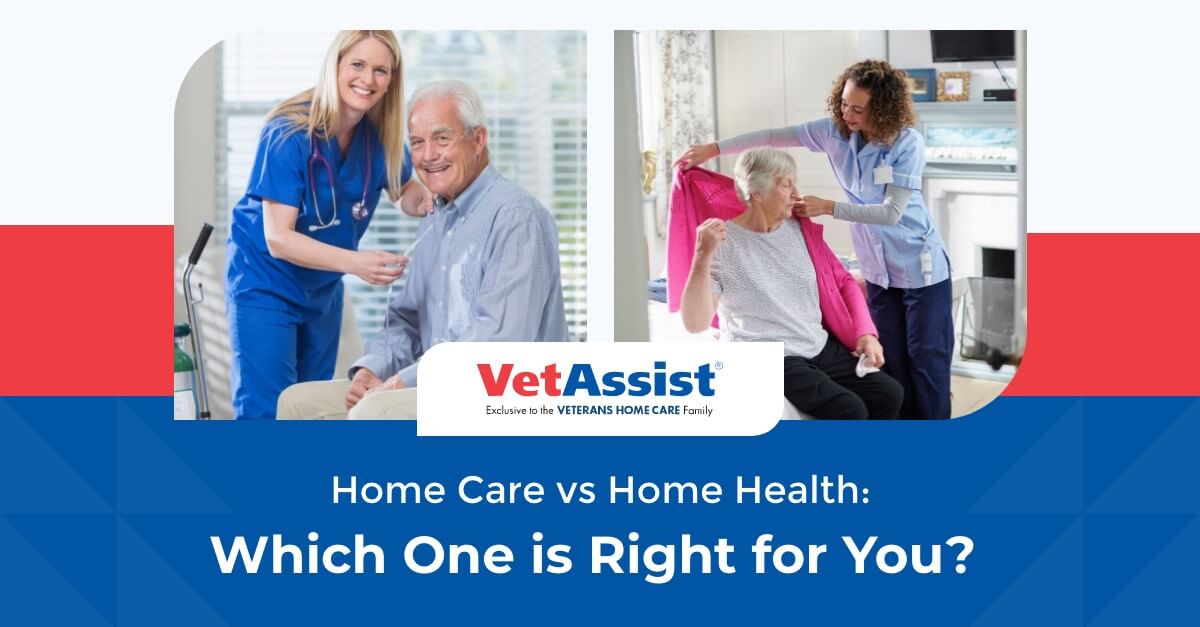Home Care vs. Home Health: Which One Is Right for You?
Though they tend to serve a similar population, there are important differences between home health and home care. While home health aids with medical treatment, health routines, and recovery, home care is an in-home support service focused on assisting with activities of daily life (ADLs) and other non-medical aid. Here, we compare the benefits, costs, and other details of home health vs. home care so that you can make the best choices for yourself or your loved one.
What Is Home Health Care?
Home health care services provide trained medical assistance by a licensed health aide. Home health care provider duties may include health testing and monitoring, wound care, pain management, and administering medication, including via injections and IVs. It may also include rehabilitative therapies such as occupational or speech therapy (for example, after a stroke).
Many patients of home health care are homebound, meaning that they are not easily or safely able to receive frequent or ongoing medical treatment at a hospital or medical office. (Medicare may officially assess a patient’s status as “homebound,” taking into account the aid they need from wheelchairs, canes, and other implements.) Home health care services serve these patients by giving them the attentive professional care they need, but at home. These patients are observed to have better health outcomes, including faster recuperation from illness and injury and a higher likelihood of maintaining their current level of everyday functioning and independence.
Home health care benefits typically do not include help with house cleaning, meal preparation, bathing and toileting, or transportation.
And What Is Home Care?
There is often overlap between recipients of home health and home care; for example, a home care provider can ensure the physical and emotional safety of an Alzheimer’s patient, relieving the burden of long-distance caregiving, even while a home health aide monitors and treats that patient’s health.
A home care aide is not a trained and licensed healthcare provider. They can offer reminders to take medications, but not administer them, and they can encourage a patient to do their physical therapy exercises, but not prescribe or teach them. They can offer valuable help in practicing cognition or memory exercises and encouraging healthy habits; as such, they help promote the patient’s good health, but do not directly manage their health.
Unlike with home health, home care is open to any senior who could benefit from in-home support, and can continue for any length of time desired.
Home Care and Home Health Work Well Together
The home health and home care aides are often partners in providing holistic care for an elderly patient. The home health visit covers assessment, monitoring, and treatment of medical conditions; at-home caregivers take care of chores, ADLs, supervision, and emotional wellbeing. Because each provider has limitations on what it can do within home elderly care services, they can combine forces to serve a wider range of needs.
Note that not all in-home help for the elderly requires at-home medical care, and home care can be hugely beneficial on its own.
Costs of Home Health vs. Home Care
In-home care for elderly patients varies in cost depending on where you live, state Medicare/Medicaid law, hours and frequency needed, and among provider agencies.
Home health is normally covered by insurance when prescribed by a doctor. Most patients must be assessed to be homebound, which also triggers coverage by Medicare. According to Genworth Financial’s 2021 research, US costs average around $27/hour (ranging from $19/hour in West Virginia to $36/hour in Minnesota). Costs depend on the level of care needed and the health professional required to administer that care; for example, registered nurse care will be more costly than more basic care by a health aide.
Home care typically costs less and varies by provider. Unless covered by your insurance plan, it is usually paid privately. It may also be covered by veterans’ benefits and worker’s compensation plans.
Taking Advantage of Home Care Benefits
If your loved one needs home care, our VetAssist mission is to make home care easily and quickly accessible for those who qualify through the VA Pension with Aid and Attendance benefit. Veterans Home Care can help you determine whether you or your loved one will be eligible to receive the benefit, which can cover some or all of the cost of home care, and we make it easy to apply. Chat with us via our website, or call us at (888) 314-6075.
By Sylvia Trein, staff writer















